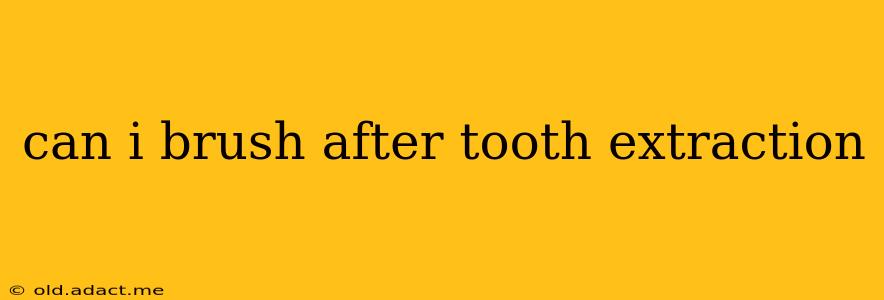Undergoing a tooth extraction can be a daunting experience, and the post-operative care is crucial for proper healing. One common question that arises is: Can I brush after tooth extraction? The answer isn't a simple yes or no. It depends on several factors, and understanding these nuances is key to preventing complications and ensuring a smooth recovery.
What Happens Immediately After Tooth Extraction?
After a tooth extraction, a blood clot forms in the socket where the tooth was removed. This clot is absolutely vital for healing. The initial 24 hours are critical. During this period, you need to be extremely gentle to avoid dislodging this protective blood clot. Rushing into vigorous brushing could disrupt the clot, leading to a painful and potentially serious complication called dry socket.
When Can I Start Brushing Again After Tooth Extraction?
Generally, you should wait at least 24 hours before brushing near the extraction site. Even then, use extreme caution. Focus on brushing the other teeth gently, avoiding the extraction area completely.
After 24 hours, you can begin gently brushing around the extraction site, but avoid directly brushing the socket itself. Use a soft-bristled toothbrush and brush with incredibly gentle strokes.
How Should I Brush After Tooth Extraction?
- Soft-Bristled Brush is Key: Harsh bristles can irritate the healing gums and dislodge the blood clot.
- Gentle Circular Motions: Avoid scrubbing or aggressive brushing. Use gentle circular motions around the extraction site, but steer clear of the socket itself.
- Rinse Gently: Use a saltwater rinse (1/2 teaspoon of salt dissolved in 8 ounces of warm water) after brushing to help clean the area and promote healing. Do not forcefully rinse or swish.
- Avoid the Extraction Site: As mentioned, actively avoid brushing directly on the extraction socket. Focus on the surrounding teeth.
- Listen to Your Dentist: Your dentist's instructions are paramount. They will provide specific advice tailored to your individual case.
What Happens if I Brush Too Soon After Tooth Extraction?
Brushing too soon or too aggressively can dislodge the crucial blood clot, leading to a dry socket. Dry socket is characterized by intense pain, a bad odor, and a visible, empty socket. It can significantly prolong the healing process and requires professional attention from your dentist.
Can I Use Mouthwash After Tooth Extraction?
Similar to brushing, you should generally avoid using mouthwash, especially those containing alcohol, for at least 24 hours after extraction. Alcohol can sting the area and potentially interfere with healing. After 24 hours, you can use a gentle, alcohol-free mouthwash, but avoid forceful rinsing.
How Long Does it Take to Fully Recover After Tooth Extraction?
Recovery time varies depending on the complexity of the extraction, but it typically takes several days to a few weeks for the initial healing to occur. Complete healing, including bone regeneration, can take several months.
What are the signs of a problem after a tooth extraction?
Signs of potential complications include:
- Severe, persistent pain: Pain that doesn't improve with over-the-counter pain relievers.
- Excessive bleeding: Bleeding that doesn't stop after several hours of applying pressure.
- Infection: Swelling, redness, pus, or fever.
- Dry socket: Intense pain, bad odor, visible empty socket.
Always contact your dentist if you experience any of these issues.
By following these guidelines and heeding your dentist's instructions, you can ensure a smooth and comfortable recovery after your tooth extraction. Remember, patience and gentle care are key to a successful healing process.
